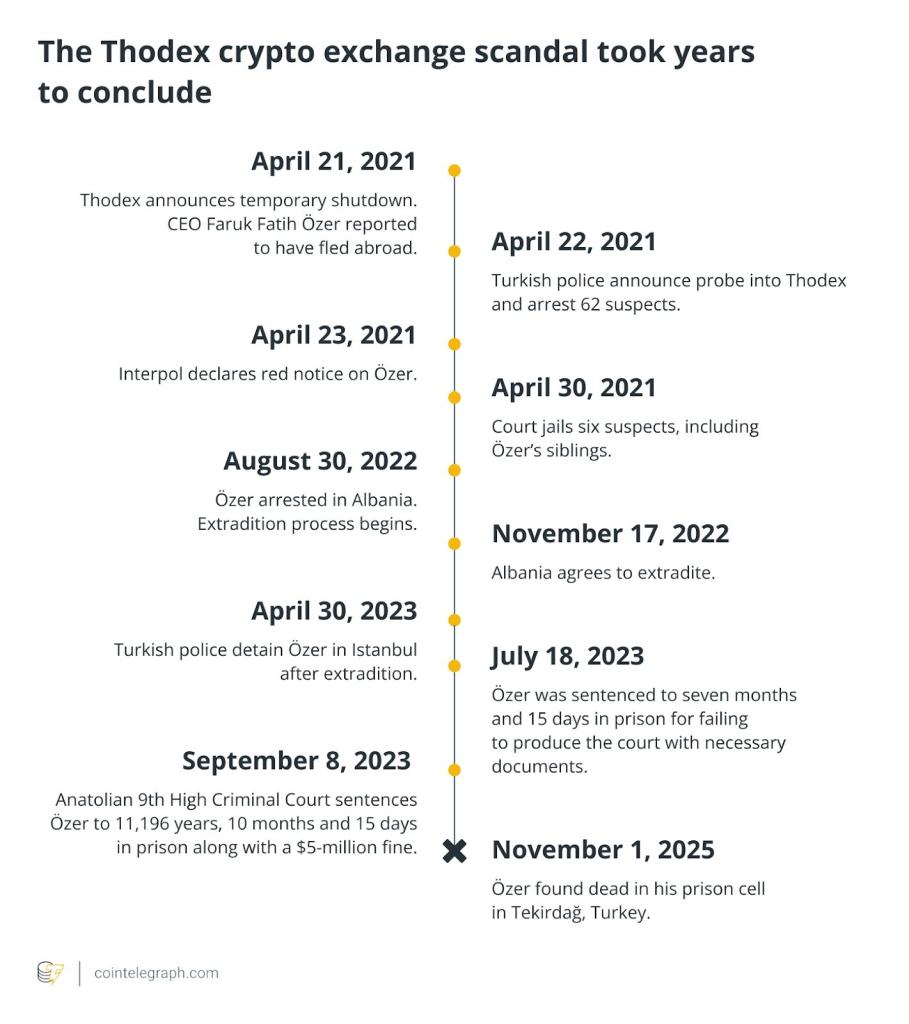The CEO of the Thodex exchange – the central figure in a $2 billion fraud – has died in prison, closing a dark chapter but also a milestone that forced Türkiye to reshape its entire legal framework for digital assets.
The death of Faruk Fatih Özer in a Turkish special security prison not only brings to an end the life of the man behind one of the largest crypto-asset scams in history, but also recalls an event that profoundly changed the country's legal system for digital assets.
Özer, the 27-year-old former CEO of Thodex exchange, was found dead on November 1 while serving a sentence of more than 11,000 years in prison for orchestrating a $2 billion Exit Scam that caused losses to nearly 400,000 investors.
The incident began on April 21, 2021, when Thodex suddenly stopped all trading and withdrawal activities, causing a shock to the market. While the exchange's official announcement reassured users that the suspension was only temporary to upgrade the system with reputable financial partners, the reality showed that Özer had disappeared, allegedly flying to Thailand with a huge amount of investors' assets.

The Istanbul Prosecutor’s Office immediately opened an investigation, police raided the Thodex office and arrested dozens of employees. Interpol then issued a global red notice for Özer. After more than a year on the run, he was arrested in Albania in August 2022 and extradited to Türkiye in April 2023 – exactly two years after the fraud was exposed.
Özer's trial was swift but left a special mark in the history of Turkish justice. On September 8, 2023, the 9th High Criminal Court of Anatolia sentenced Özer and his two younger brothers to 11,196 years, 10 months and 15 days in prison for organized fraud, money laundering and forming a criminal organization.
In his defense, Özer remained defiant, claiming he was being framed and saying: “If I wanted to create a criminal organization, I would not have acted in such an amateurish manner.” His death at the Special Security Detention Facility No. 1 in Tekirdağ – which Capital been criticized by human rights organizations for its harsh detention conditions – brought a tragic end to the shocking case.
From $2 billion scandal to comprehensive legal reform
The shock of Thodex’s collapse has forced Turkish policymakers to act quickly and decisively, exposing serious gaps in a burgeoning digital asset market that lacks a regulatory framework.
The first response was urgent: just days after Özer fled, the Central Bank of the Republic of Turkey (CBRT) issued a ban on the use of crypto assets for payment purposes, while also preventing payment service providers from acting as Fiat On-Ramp for exchanges. The goal was to prevent systemic risk and limit the flow of illicit Capital from the market.

Shortly thereafter, the Financial Crimes Investigation Agency (MASAK) quickly amended the Anti-Money Laundering and Terrorist Financing (AML/CFT) regulations, officially placing virtual asset service providers (VASPs) under supervision. However, these measures are only short-term responses – a comprehensive legal reform is inevitable.
The reform process culminated in the Turkish Parliament passing the Capital Markets Law Amendment Act, which will come into effect in 2024. This is the first comprehensive legal framework for the country’s digital asset industry. The law strictly regulates the licensing of exchanges and VASPs, and requires strict compliance with minimum Capital , cybersecurity, risk management, and asset custody standards.
More importantly, the law focuses on investor protection, ensuring information transparency and risk disclosure obligations. The government’s dual goal is to restore market order while removing Turkey from the FATF “grey list” – a group of countries with high risks of money laundering and terrorist financing.
Ironically, the Thodex scandal has become a catalyst for the maturation of the digital asset market in Türkiye. The removal of a negative actor has accelerated the process of building a more transparent and safer legal corridor for investors.
Amid high inflation and a depreciating lira, crypto assets are increasingly becoming a preferred haven asset. According to a Chainalysis report, Türkiye is now among the countries with the fastest growth in digital assets in the world.








